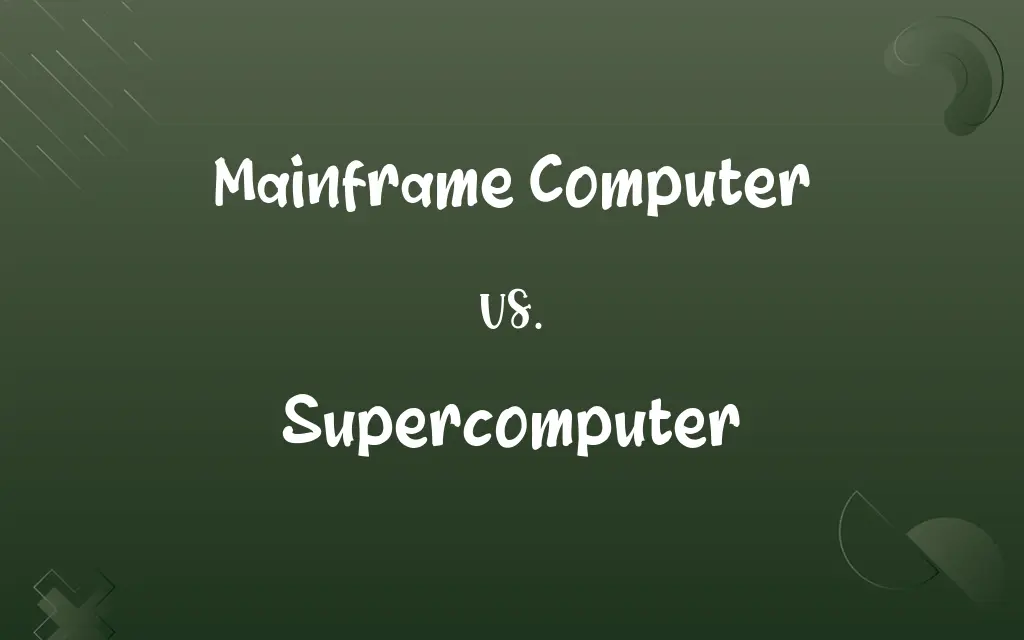Mainframe Computer vs. Supercomputer: Know the Difference

By Shumaila Saeed || Published on December 31, 2023
A mainframe computer is a large-scale computing system designed for multi-user operations, while a supercomputer is a high-performance machine specialized in handling complex calculations.

Key Differences
Mainframe Computers are designed for large-scale processing and management of data, typically used in industries like banking and healthcare for transaction processing, critical applications, and bulk data processing. Supercomputers, on the other hand, are built to perform complex scientific calculations at extremely high speeds, serving fields like climate research, quantum mechanics, and molecular modeling.
Shumaila Saeed
Dec 31, 2023
While Mainframe Computers are valued for their reliability, scalability, and efficient handling of large volumes of transactions, Supercomputers are characterized by their exceptional computational speed and ability to perform trillions of calculations per second, prioritizing raw processing power for advanced scientific computations.
Shumaila Saeed
Dec 31, 2023
Mainframe Computers have an architecture optimized for data throughput and stability, supporting numerous users and applications simultaneously. Supercomputers often use a parallel processing architecture, enabling them to execute multiple complex computational tasks simultaneously at very high speeds.
Shumaila Saeed
Dec 31, 2023
Mainframe Computers, though expensive, are generally more accessible to businesses and organizations for commercial use, offering a stable platform for critical applications. Supercomputers, due to their specialized nature and the cost associated with their immense processing power, are less accessible, usually operated by government agencies, research institutions, and large organizations.
Shumaila Saeed
Dec 31, 2023
Mainframe Computers have evolved to become more modern, with improved processing capabilities and cloud integration, continuing to serve as the backbone for many enterprise applications. Supercomputers are constantly pushing the boundaries of computing, with a focus on exascale computing and artificial intelligence applications.
Shumaila Saeed
Dec 31, 2023
ADVERTISEMENT
Comparison Chart
Purpose
Data processing and transaction management
Advanced scientific and complex calculations
Shumaila Saeed
Dec 31, 2023
Performance
High efficiency in handling large data volumes
Extremely high computational speed
Shumaila Saeed
Dec 31, 2023
Design
Optimized for data throughput and multi-user support
Parallel processing for simultaneous complex tasks
Shumaila Saeed
Dec 31, 2023
Cost
Expensive but more accessible for commercial use
Highly specialized and costly, used by select institutions
Shumaila Saeed
Dec 31, 2023
Evolution
Continues to modernize with cloud and improved processing
Advancing towards exascale computing and AI integration
Shumaila Saeed
Dec 31, 2023
ADVERTISEMENT
Mainframe Computer and Supercomputer Definitions
Mainframe Computer
A powerful computing system for processing large-scale data transactions.
The bank relies on its Mainframe Computer to process millions of transactions daily.
Shumaila Saeed
Dec 10, 2023
Supercomputer
A powerful computing machine designed for scientific and theoretical modeling.
A Supercomputer helped in predicting climate change patterns over the next century.
Shumaila Saeed
Dec 10, 2023
Mainframe Computer
A high-capacity computer system used for large-scale computational tasks.
Insurance companies utilize Mainframe Computers for policy management and claim processing.
Shumaila Saeed
Dec 10, 2023
Supercomputer
A highly advanced computer for performing complex and intensive calculations.
Researchers used a Supercomputer to simulate the effects of a black hole.
Shumaila Saeed
Dec 10, 2023
Mainframe Computer
A multi-user computer capable of supporting numerous simultaneous processes.
Universities often use Mainframe Computers to handle administrative and academic data.
Shumaila Saeed
Dec 10, 2023
ADVERTISEMENT
Supercomputer
An elite computer system for executing tasks beyond the scope of general-purpose computers.
Astrophysicists employed a Supercomputer to analyze data from distant galaxies.
Shumaila Saeed
Dec 10, 2023
Mainframe Computer
A robust and reliable system for critical applications in large organizations.
Hospitals use Mainframe Computers to maintain patient records securely and efficiently.
Shumaila Saeed
Dec 10, 2023
Supercomputer
A computer with advanced capabilities for research and problem-solving in complex domains.
The Supercomputer calculated possible drug interactions in a fraction of the time it would take conventional computers.
Shumaila Saeed
Dec 10, 2023
Mainframe Computer
A centralized computer used for extensive data processing and enterprise management.
Corporations use Mainframe Computers to manage their extensive customer databases.
Shumaila Saeed
Dec 10, 2023
Supercomputer
A high-performance computer used in specialized fields requiring immense computational power.
The Supercomputer was instrumental in decoding the human genome.
Shumaila Saeed
Dec 10, 2023
Supercomputer
A mainframe computer that is among the largest, fastest, or most powerful of those available at a given time.
Shumaila Saeed
Dec 08, 2023
Supercomputer
(computing) Any computer that has a far greater processing power than others of its generation; typically they use more than one core and are housed in large clean rooms with high air flow to permit cooling. Typical uses are weather forecasting, nuclear and other natural science simulations, advanced mathematics and animations.
Shumaila Saeed
Dec 08, 2023
Supercomputer
A mainframe computer that is one of the most powerful available at a given time
Shumaila Saeed
Dec 08, 2023
Repeatedly Asked Queries
What are Supercomputers used for?
Supercomputers are used for complex scientific calculations, such as climate modeling, quantum physics simulations, and advanced research projects.
Shumaila Saeed
Dec 31, 2023
Are Supercomputers accessible to the general public?
Generally, no. Supercomputers are usually operated by research institutions, government agencies, and large organizations due to their specialized nature and cost.
Shumaila Saeed
Dec 31, 2023
What is a Mainframe Computer?
A Mainframe Computer is a large, powerful computer system designed for processing and managing large volumes of data, often used in commercial and institutional environments.
Shumaila Saeed
Dec 31, 2023
What is parallel processing in Supercomputers?
Parallel processing in Supercomputers refers to the ability to perform multiple computational tasks simultaneously, greatly enhancing speed and efficiency.
Shumaila Saeed
Dec 31, 2023
How do Mainframe Computers and Supercomputers differ in performance?
Mainframe Computers prioritize data processing efficiency and stability, while Supercomputers focus on high-speed, complex calculations.
Shumaila Saeed
Dec 31, 2023
Are Mainframe Computers outdated?
No, Mainframe Computers continue to evolve and are integral to many industries for reliable, large-scale data processing.
Shumaila Saeed
Dec 31, 2023
Do Mainframe Computers require specialized software?
Yes, Mainframe Computers often require specialized software tailored to their unique architecture and capabilities.
Shumaila Saeed
Dec 31, 2023
Can Mainframe Computers handle multiple users?
Yes, Mainframe Computers are designed to support multiple users and applications simultaneously, making them ideal for enterprise-level tasks.
Shumaila Saeed
Dec 31, 2023
How fast can Supercomputers perform calculations?
Supercomputers can perform trillions of calculations per second, making them among the fastest computing machines in the world.
Shumaila Saeed
Dec 31, 2023
Can small businesses use Mainframe Computers?
While possible, Mainframe Computers are generally more suited to large organizations due to their size and cost.
Shumaila Saeed
Dec 31, 2023
What industries rely heavily on Mainframe Computers?
Industries like banking, healthcare, insurance, and government agencies heavily rely on Mainframe Computers for data processing.
Shumaila Saeed
Dec 31, 2023
Is a Mainframe Computer the same as a server?
No, while both can serve multiple users, Mainframe Computers are larger and more powerful, designed for more complex and critical tasks.
Shumaila Saeed
Dec 31, 2023
What kind of tasks are Supercomputers not good at?
Supercomputers are not typically used for simple data processing or tasks that do not require immense computational power.
Shumaila Saeed
Dec 31, 2023
Can Mainframe Computers be used for cloud computing?
Yes, modern Mainframe Computers are often integrated with cloud computing for enhanced scalability and resource management.
Shumaila Saeed
Dec 31, 2023
Can Supercomputers help in AI research?
Yes, Supercomputers are instrumental in advancing AI research, especially in areas requiring substantial computational power.
Shumaila Saeed
Dec 31, 2023
How do Supercomputers contribute to medical research?
Supercomputers assist in medical research by simulating drug interactions, disease spread models, and analyzing complex biological data.
Shumaila Saeed
Dec 31, 2023
Are there any environmental concerns with Mainframe Computers and Supercomputers?
Yes, both consume significant energy and require cooling systems, raising concerns about their environmental impact.
Shumaila Saeed
Dec 31, 2023
How energy-efficient are Mainframe Computers?
Modern Mainframe Computers are designed to be more energy-efficient than their predecessors, though they still consume significant power.
Shumaila Saeed
Dec 31, 2023
Are Supercomputers used in space exploration?
Yes, Supercomputers play a crucial role in processing data for space exploration and astronomical research.
Shumaila Saeed
Dec 31, 2023
What is the average lifespan of a Supercomputer?
The lifespan of a Supercomputer varies but is typically several years, as technological advancements quickly render older models less effective.
Shumaila Saeed
Dec 31, 2023
Share this page
Link for your blog / website
HTML
Link to share via messenger
About Author
Written by
Shumaila SaeedShumaila Saeed, an expert content creator with 6 years of experience, specializes in distilling complex topics into easily digestible comparisons, shining a light on the nuances that both inform and educate readers with clarity and accuracy.









































































